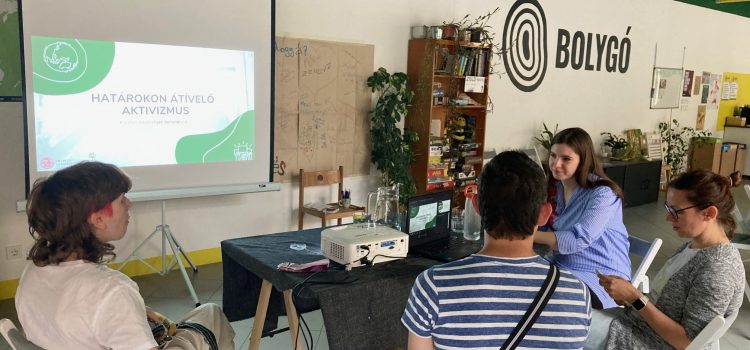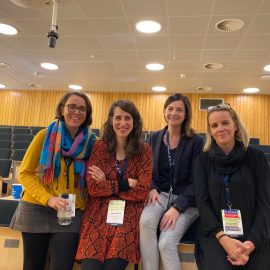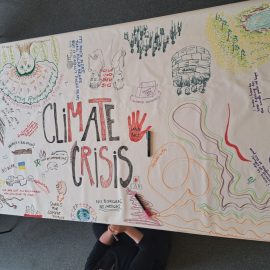
by Orsolya Kovács-Magosi
An “overcrowded” avenue on a hot late afternoon in June… five people sitting in a public space, called “Bolygó” (“Planet”) in this grey urban environment in Budapest, hearing dozens of cars passing by and discussing the future of the planet and our country. A rather ambivalent picture. Here we are: Annamária, Panni and Orsi, members of the YDIGI research groups joined by Lili and Marci, FFF activists in Hungary.
The more than two-year long research has arrived to a very important milestone: sharing the results and best-practices with the ones closely involved in climate activism. This time not at a scientific conference, but in a much more informal atmosphere. While we were sitting in one side of the room discussing the presentation, the other part of the place was relatively busy. It’s a safe place for people committed to the environment, who come here after work either for a chat, a drink, a board game or a film to experience the cohesive power of their community. Even though, our “event” was advertised as public, we resigned ourselves to the fact that this time we didn’t reach as many people as we would have liked. And I could list many reasons for that: what is for sure is that the last period, the economic crisis, inflation, the war in our neighborhood has put a lot of strain on people and the climate change issue moved to the back of the list for many.
Since 2019 when the Fridays for Future kicked off in Hungary a lot has happened: numerous school strikes and global demonstrations took place, and it really was a big thing in Hungary that a youth-empowered climate movement was able to call thousands of people to the streets. No other environmental movement was able to do that before. And as everything else, FFF also has had its ups and downs in the past few years: as the COVID-19 broke out these enthusiastic young people were forced to move to the online spaces. The general public and media discourse also transformed tremendously and since the outbreak of the war in Ukraine, the urgency of climate inaction was replaced by energy-supply-related issues in the Hungarian headlines. These tendencies are also reflected in our results.
Climate activism-research has flourished in an incredible way in the last few years. However, it is important to point out that in most of these cases – logically – the adults were the ones who observed the youth by drawing far-reaching conclusions without making them active participants in this process. And this is what we tried to avoid during the whole time – it was very important for us throughout the research process to not only be observers and describe the young climate activists, but to provide them an opportunity to be active contributors in the research. We talked about the how FFF members are depicted by the media, what kind of narratives appeared in online comments, or how this generation use new media tools. The most enjoyable part of this meeting were the questions that Lili and Marci raised. These couple of hours turned out to be a wonderful occasion to collective thinking and brainstorming, and even though the movement is now rather in an “inactive” period – there was no despair in the atmosphere, but an unbroken desire to do something for our planet.



